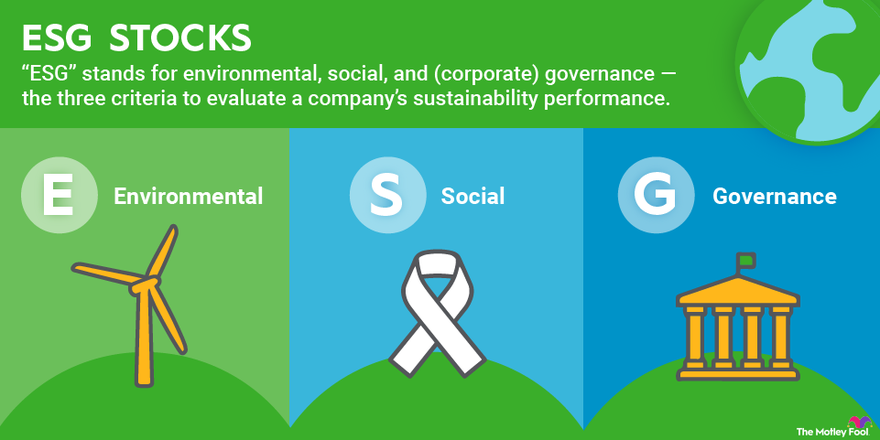ESG investing is a form of socially responsible investing that prioritizes financial returns and emphasizes a company’s effects on the environment, its stakeholders, and the planet.

The financial performance of ESG stocks has recently drawn investor attention. During the market turbulence related to the COVID-19 pandemic, many companies with strong ESG track records showed lower volatility than their non-ESG counterparts.
To many investors, the performance validated ESG investing and its premise -- that good corporate behavior means better business results.
It has also gained considerable attention from the U.S. Securities and Exchange Commission (SEC). In March 2024, the SEC announced that it had finalized the adoption of rules that standardize climate-related disclosures by public companies and in public offerings. Addressing the rules, SEC Chair Gary Gensler said the rules would require climate risk disclosures to be included in SEC filings, such as annual reports and registration statements, rather than on company websites.
SEC (Securities and Exchange Commission)
What ESG means
What does ESG stand for?
"ESG" stands for environmental, social, and (corporate) governance.
E is for environmental
The environmental component addresses how a company affects the planet through:
- Climate change policies.
- Greenhouse gas emissions.
- Carbon footprint and carbon intensity.
- Water usage and conservation, overfishing, and waste disposal.
- Renewable energy usage.
- Recycling and disposal practices.
- Green products, technologies, and infrastructure.
- Employee incentives promoting carpooling, public transportation, bicycle commuting, etc.
- Relationships with the U.S. Environmental Protection Agency (EPA) and other environmental regulatory bodies.
S is for social
The social component of ESG covers issues affecting employees, customers, consumers, suppliers, and the local community. Examples include:
- Employee treatment and compensation.
- Employee engagement and turnover.
- Employee training and development.
- Employee safety policies and sexual harassment prevention.
- Diversity and inclusion in hiring, promotions, and pay increases.
- Ethical supply chain sourcing.
- Mission or higher purpose.
- Customer service performance.
- Consumer protection activity, including lawsuits, recalls, and regulatory penalties.
- Lobbying efforts and public stance on social justice issues.
G is for governance
The governance component relates to board independence, leadership effectiveness, and business ethics. Specific topics include:
- Executive compensation, bonuses, and perks -- and whether they're tied to long-term business value.
- Policies that define and enforce ethical business practices.
- Diversity of the board and management team.
- Potential for conflicts of interest for board members.
- Shareholders' ability to nominate board candidates.
- Whether term lengths differ among board members.
- Separation of the chairman and CEO roles.
- How board votes are decided -- by a majority or by who receives the most votes.
- Whether the company issues dual- or multiple-class stock.
- Transparency of shareholder communications
- History of shareholder lawsuits.
- Relationships with the SEC and other regulatory bodies.
Evaluating ESG performance
How to evaluate corporate ESG performance
1. Corporate reporting
Companies committed to ESG initiatives should publish measurable goals, plus the progress against those goals, in periodic sustainability reports.
Some sustainability reports are better than others, however. Look for reporting that follows ESG standards established by the Global Reporting Initiative (GRI) and/or the United Nations Principles for Responsible Investment (PRI).
2. Third-party sources
You can also use third-party sources to validate sustainability reports, such as:
For employee-related issues specifically, see:
- Fortune's Best Companies to Work For
- Forbes' Just 100
- Employee reviews on websites such as Glassdoor.com
To research corporate governance attributes, access proxy statements on the SEC's website by searching for the filing type DEF 14A.
Carbon Credits
Portfolio risk reduction
ESG stocks reduce portfolio risk
In any industry, environmental, social, and governance issues pose serious risks to operations and profits. Below are three examples of negative outcomes that could have been mitigated with proactive ESG policies.
- Electric vehicle (EV) maker Tesla (TSLA -5.06%) agreed to pay $1.5 million in 2024, stemming from allegations that it had mishandled hazardous waste in California. If the company implemented better environmental management systems, the issue could have been avoided.
- Tyson Foods (TSN -0.53%) was sued in 2020 for wrongful death after employees with COVID-19 symptoms were allegedly ordered to continue reporting for work.
- In 2024, the Consumer Financial Protection Bureau (CFPB) charged Toronto-Dominion Bank (TD 1.04%) almost $28 million in penalties for the bank's failure to provide accurate customer information to credit agencies, resulting in possible harm to their credit scores. The CFPB also ordered TD Bank to implement better measures to ensure that such violations didn't happen again.
Companies actively working to address risks like these should see fewer business disruptions and produce more reliable financial results over time, providing less risk for shareholders.
Higher returns
High ESG focus, high returns
There's also growing research that shows ESG stocks generate comparable or superior financial results compared with their non-ESG-focused peers.
Asset management start-up Arabesque found that S&P 500 (SNPINDEX:^GSPC) companies in the top quintile for ESG outperformed those in the bottom quintile by more than 25% between 2014 and 2018. The stock prices of ESG companies were also less volatile.
In The Journal of Applied Corporate Finance, Dan Hanson and Rohan Dhanuka concluded that "there seems to be clear evidence that companies with high non-financial indicators of quality seem to perform significantly better on market and accounting-based metrics."
Strong leadership
ESG as an indicator of strong leadership
Why ESG companies perform better isn't clear. One theory is that a corporate ESG focus requires exemplary leadership. ESG initiatives are long-term programs, and a leadership team's ability to realize long-term outcomes -- while running the core business well -- is a competitive strength.
Risks
Risks of ESG investing
- Lack of universal ESG standards. There are no agreed-upon standards for evaluating ESG performance, creating inconsistencies in ESG portfolios and funds. You may be surprised to find some ESG funds hold tobacco stocks, for example.
- No long-term data on the financial performance of ESG companies. Longer-term data could show that ESG companies aren't as resilient as once thought. If that happened, investors who are wholly focused on financial returns would likely shift away from the ESG sector.
- Companies could stop reporting on ESG issues. Companies could stop voluntarily reporting sustainability data. Lowering the priority of ESG attributes could reduce the supply of high-quality, investable ESG companies.
Related investing topics
Is ESG investing right for you?
If you want to achieve strong financial returns while supporting companies with sustainable, future-oriented business practices, then ESG investing may be right for you.



















